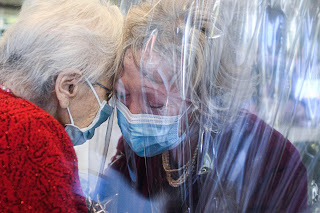Nursing Homes Vs. Assisted Living During Covid
It goes without saying that COVID-19 has been difficult for everyone. Like with any major issue, some groups were more disproportionately susceptible when compared to others. Unfortunately, one of the groups who are at the most risk is the elderly. They are already weakened due to the natural process of aging. However, many of the elderly people who live in nursing homes are further weakened by the underlying health conditions that put them in the nursing home in the first place.
I recently went through this experience firsthand with my grandma. She had been rapidly losing weight and becoming very weak due to being on a variety of medications that suppressed her appetite. After she had a bad fall that required an Emergency Room visit and 9 staples in her head, my family was able to convince her to go into a nursing home for rehab until she was strong enough to go back to her home. When she was admitted in June 2019, she only weighed 77 pounds. Over the next few months, she made amazing progress. She regained her strength, finished eating all her meals, and was getting back to a healthy weight. She was looking forward to returning home. Then COVID hit and her nursing home (along with the rest of the world) went into lockdown to try to control the spread of COVID.
At first, the nursing home strictly followed all COVID guidelines
from CDC, to keep the residents safe. COVID
vaccinations and booster shots were given to patients whose families gave their
consent. When patients got COVID, they were isolated on a floor dedicated to
only COVID patients. For almost a year, no visitation was permitted, and
residents weren’t even allowed to even leave their small rooms. This isolation was especially hard for the
dementia patients. When visitation was permitted
again, I could see a rapid decline in the mental and physical condition of my grandma
and all the other residents – especially those that had dementia.
By August of 2022, most of the COVID restrictions were more
relaxed. The nursing home stopped isolating COVID patients on another floor. I was shocked to see that some of the health
care providers had even stopped wearing their masks. When they did wear a mask, it was either the
face shield (which had been proven to be ineffective) or they had the mask on
below their nose or under their chin which was also pointless. When the patients across the hall from my Grandma
got COVID, it spread quickly to all other patients up and down the hall - including
my grandma. She developed complications from having COVID and had to be put on
a ventilator in the ICU for a week before she was released into Hospice care. After
a month and a half of suffering, she passed away in October. I believe that if my grandmother had been
eligible for at home care, she would’ve been able to live longer.
I believe home care is a better alternative for seniors who are in the early stages of dementia. The biggest advantage of home care (or the age-in-place model) is that your loved ones can stay in their own home where they feel comfortable and safe for as long as possible. Allowing the seniors to stay in their own home is less disorienting for them since they don’t have to be moved to an unfamiliar facility, a memory care unit, or a nursing home. Also, by staying in their own home, seniors aren’t restricted by visitation hours or number of visitors. They can have family and friends visit them any time, which will help them feel less lonely. A home caregiver (or “companion”) can help your loved one with all their daily activities as well as meal planning and preparation, cleaning, buying groceries, and taking your loved ones to their doctor appointments.
If you would like to learn more about home care benefits and services, please visit https://www.thepurplenest.net/.
Written
By:
Anand
Kailasam
References:
https://claudepeppercenter.fsu.edu/coronavirus-covid-19-and-you/covid-19s-impact-on-long-term-care/
Image
Source:



Comments
Post a Comment